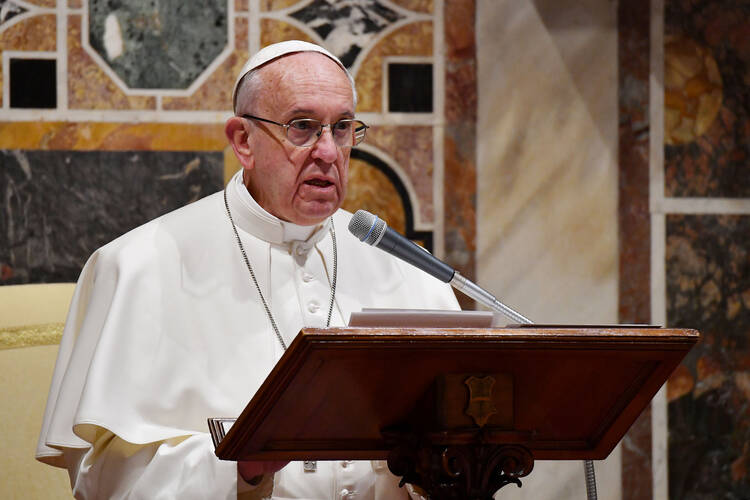Pope Francis has created a “third section” of the Vatican’s Secretariat of State that is to deal with all personnel questions relating to those in the diplomatic service of the Holy See.
The Vatican, announcing this today, Nov. 21, said this new unit will be called “the section for the personnel of the diplomatic service of the Holy See.” It said the Delegate for the Pontifical Representations (that is diplomatic missions to states and the international organizations) will head this section. The Polish monsignor, Jan Romeo Pawlowski, now holds that post.
Traditionally, there have been two “sections” in the Secretariat of State: the Section for the General Affairs of the Church (“the first section”), and the Section for Relations with States (“the second section”).
Since becoming pope, Francis has given special attention to the Holy See’s diplomatic staff.
The first section is headed by the “substitute” in the Secretariat of State and has a staff of around 140 persons, composed of clerics, religious and laity. The Italian archbishop Angelo Becciu has held the role of “substitute” since May 2011, a position equivalent to that of the chief of staff in a state government.
The second section is headed by the secretary for relations with states and has a staff of some 60 persons, also composed of clerics, religious and laity. The English-born archbishop Paul Gallagher currently holds the post of secretary for relations with states, the equivalent of the foreign minister.
Up to now, the first section held the brief for handling all matters relating to the personnel of the Holy See’s diplomatic service. Pope Francis has now shifted this important role to the new third section. Nevertheless, the first section continues to retain responsibility for “the general questions of the pontifical representations”—in other words, the administrative aspects.
The Holy See has about 100 diplomatic personnel in its missions around the world.
Pope Francis outlined the changes in a letter to the secretary of state, Cardinal Pietro Parolin, dated Oct. 18, and explained the role and function of the third section.
He decreed that the present office of the Delegate for Pontifical Representations is to be strengthened and given adequate staff for its new role. Significantly, he decided that the third section will respond directly to the Secretary of State, a post held by the Italian cardinal Pietro Parolin since August 2013.
In the letter, Francis recalled that since becoming pope he has given special attention to the Holy See’s diplomatic staff and twice held meetings in the Vatican with all the nuncios—in 2014 and 2016. He went on to explain that the new section is meant to show even more fully the attention and closeness that he and the top officials of the Secretariat of State have for the diplomatic staff.
Pope Francis’ decision to create the third section is but the latest in a series of reforms of the Roman Curia.
The Holy See has about 100 diplomatic personnel in its missions around the world plus many others working in the Secretariat of State.
Pope Francis decreed that the third section will “occupy itself exclusively” with all the questions and problems related to the persons working in the Holy See’s diplomatic service or preparing for that service in the Vatican’s Pontifical Ecclesiastical Academy and will, therefore, be directly involved “in the selection, initial and permanent formation, conditions of life and service, promotions, permissions, the local staff and so on.”
He emphasized that the third section “will enjoy proper autonomy” in this work. At the same time, it will seek to establish “close collaboration” with both the Section for the General Affairs of the Church (the first section), “which will continue to deal with the general questions of the pontifical representations” and with the Section for Relations with States (the second section), “which will continue to deal with the political aspects of the work of those representations.”
Francis also decreed that the delegate who heads the third section will have other important roles. He will participate with the heads of the other two sections in the weekly meetings for the coordination of work, which the secretary of state chairs. He will also convene the meetings for the nominations to the pontifical representations, and he will be responsible, together with the president of the Pontifical Ecclesiastical Academy, for the selection and formation of candidates for the diplomatic service of the Holy See.
His decision to create the third section is but the latest in a series of reforms of the Roman Curia that Pope Francis, with the assistance of his nine cardinal advisors, has enacted over the past four years. But the work is not yet finished, and sources told America that the pope could make other reforms to the Secretariat of State in the coming year, to ensure that it is able to provide adequate support to the Bishop of Rome in his role as pastor of the universal church.










